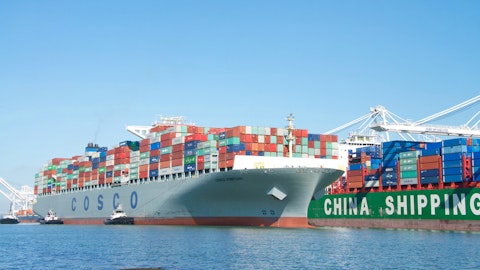Cindy Wang: Yeah, AI definitely as James and Jane explained, it will have an impact for all the industries. For our industry, it will impact, for example, will help us to increase the efficiencies of our service center. And on the same time, will change the — potentially change the user behavior on the search result. But in general, I think in travel industry still, our growth were based on a couple of fundamental things. First is the service capability or excellent service qualities that we offer to the users, which will help users to have a peace mind — peace of mind, especially when they travel, for example, in the long haul or to the outbound destinations. And second is the competitiveness of our inventory. Once you have the best inventory to serve your customers, you were definitely weighing a lot of users.
I think going forward, definitely move from offline to online will continue to fuel our future growth. But a couple of few things that I think Jane already explained in the earlier question that we think our long-term growth will have — even after the COVID, we think our long-term growth will be in the range of the teens to 20s. There’s a couple of growth drivers. And the first one is the expansion of our user bases as a result of our increased online penetration, particularly in the mid- to lower-tier cities. This larger population increased the GDP per capita, present opportunities for our future business growth. And the second one is an increased purchasing frequency and cross-selling ratios, which will also contribute to the continuous growth of our business.
Our transportation to the accommodation cross-selling ratio has improved by more than 40% as compared with the pre-COVID level. Last, but not least, the robust growth and improved profitability of our Trip.com business. Our global OTA business will also significantly contribute to the group’s long-term development. Thank you.
Operator: Thank you for the questions. Our next question comes from Thomas Chong of Jefferies. Please go ahead.
Thomas Chong: Hi, good morning. Thanks management for taking my questions and congratulations on a strong set of results. My question is about capital allocation. Can management comment about the capital allocation plan for the utilization of your cash? Thank you.
Cindy Wang: Sure. Our capital allocation approach is guided by a disciplined framework that prioritize the four key objects. The first is ensuring the sustainable operation in the face of the macroeconomic uncertainties, especially we just experienced a pandemic. During the pandemic, the top priority for us is to have a positive operating cash flow. That is the key success factor to help us to [weather] (ph) through the whole pandemic period. And the second one is investing in the strategic initiatives that will drive our long-term growth, for example, our investment into the AI, our investment in our global business, Trip.com, et cetera. And the third one is to fulfilling our debt obligations. And the last one and most important one is we will consider how to return our capital to return it back to long-term shareholders. Thank you.
Operator: With that, we would like to come to a close for the Q&A session. Allow me to hand the call back to Mr. Michelle Qi for closing remarks.
Michelle Qi: Thank you. Thanks, everyone, for joining us today. You can find the transcript and webcast of today’s call on investors.trip.com. We look forward to speaking with you on our third quarter of 2023 earnings call. Thank you, and have a good day.
Cindy Wang: Thank you, everyone.
Jane Sun: Thank you.
Operator: Ladies and gentlemen, that concludes today’s conference call. Thank you for your participation. You may now disconnect your lines.
Follow Trip.com Group Limited (NASDAQ:TCOM)
Follow Trip.com Group Limited (NASDAQ:TCOM)
Receive real-time insider trading and news alerts




